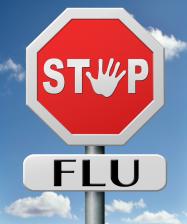What’s the Difference Between the Cold and Flu?
It’s winter season and that means rampant cold and flu viruses. But what’s the difference between the two? How can you tell which bug is your invader? And how can you prevent catching what the coworker in the next cubicle is plagued with? The House Call Doctor is in.

But what’s the difference between the two? This is a question I hear frequently in my medical practice. The cold and flu have very similar features and both are caused by viruses, so how do they differ? And why do we still get sick even after getting the flu shot? Let’s learn the answers to these important questions in today’s episode.
How Are Cold and Flu Similar?
I’ve discussed the flu virus before and I’ve discussed the cold virus before. But we’ve never tackled them head-to-head.
Let’s discuss the similarities first:
-
They are both caused by viruses and these viruses mutate and change through time – especially from one year to the next.
-
They are both transmitted via air droplets or via touch.
-
They are both self-limiting, which means they cause an illness that resolves on its own via your robust immune system that eventually kills the invaders. Viral syndromes like the cold and flu often last about 7-10 days, with the peak symptoms occurring on day 4 and 5 and then gradually improving thereafter.
-
There is not a cure for either one. Once you catch one of these bugs, it simply needs to run its course.
-
The only way to treat them is with symptomatic relief – typically rest, fluids, and over-the-counter aids to prevent the symptoms from destroying your quality of life during those 7-10 days.
-
Antibiotics don’t cure either one. Antibiotics kill bacteria, they don’t touch viruses.
-
They can both cause the following symptoms:
Fever
- Fatigue
- Headache
- Malaise
- Cough
- Sore throat
- Runny or stuffy nose
How Are Cold and Flu Different?

-
The flu tends to be nastier. It causes several thousand deaths per year in the United States alone.
-
Fatigue is often much more pronounced in the flu and it often accompanies body aches. Patients often describe it as feeling as though they got “Hit by a truck.” The common cold is no fun either, but the fatigue is milder and it often isn’t accompanied by body aches.
-
The nasal symptoms (runny or stuffy nose) are often mild or absent in the flu. In contrast, they are the most pronounced features of the cold. If you have tons of fluid build-up in the nasal passages and/or drainage down the throat, it’s likely you’re suffering from the common cold.
-
The common cold is, well, more common.
-
There’s a vaccine to prevent the most common strains of the flu running rampant each year (we need a new one annually since the virus mutates so rapidly). But can you still get the common cold even after receiving the flu vaccine? Absolutely, because they are often different bugs. But again, the flu is riskier, making the flu vaccine very valuable for many people. I make sure to get myself and my family vaccinated against the flu every year.
How to Prevent the Cold and Flu
Other than the flu vaccine, abiding by the following rules will help to greatly decrease your chance of transmission of the cold and flu virus (whether you are the one infected or someone else):
-
Wash your hands often, for at least 20 seconds, with soap and water.
-
Don’t touch your face, and if you do, immediately wash your hand and face right after.
-
Do not cough or sneeze in the air. If you need to cough or sneeze, do so in a tissue, if readily available, then immediately discard the tissue and wash your hands. If no tissue is readily available, then cough/sneeze into your elbow sleeve.
-
Avoid sharing cups or utensils and try to minimize any hugging or kissing.
-
Disinfect frequently-touched surfaces, like door handles, keyboards, the computer mouse, etc.
Share your ideas and learn more quick and dirty tips with us on the House Call Doctor’s Facebook and Twitter pages! You can even find me on Pinterest!
Please note that all content here is strictly for informational purposes only. This content does not substitute any medical advice, and does not replace any medical judgment or reasoning by your own personal health provider. Please always seek a licensed physician in your area regarding all health related questions and issues.
You May Also Like…


 Fever
Fever




